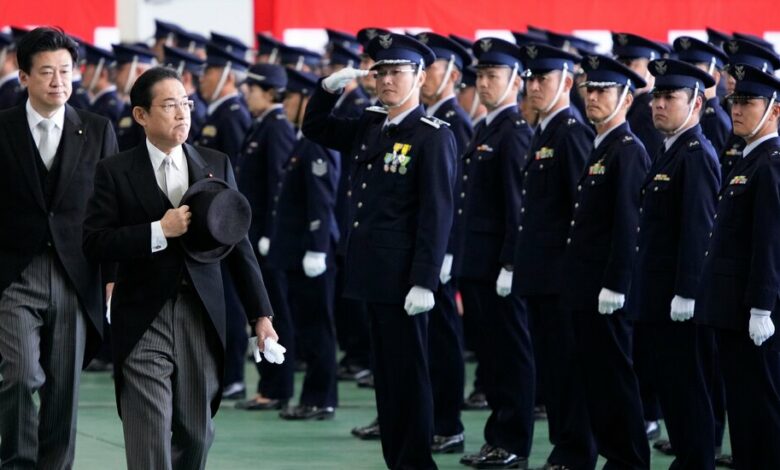The Yen is falling. And so is Japan’s defense budget.

The collapse of the yen this year to its lowest point in nearly four decades, undermining Japan’s plans for the largest military buildup in postwar history.
The government has slashed orders for aircraft, and officials warn that further cuts could be imminent. Japan buys much of its military equipment from U.S. companies, in transactions made in dollars. The government’s purchasing power has been drastically eroded by the declining value of the yen.
“What we’re achieving in terms of actual defense capabilities and our original goal — the two are not aligned,” Satoshi Morimoto, a former Japanese defense minister, said in an interview. The value of the defense budget over five years “has effectively been reduced by 30 percent,” Mr. Morimoto said.
Japan’s currency headache comes at a critical time. The country’s big military spending increase was intended to bolster its defenses as Tokyo grapples with growing missile threats from North Korea and other challenges from China, including fears of a potential conflict between China and Taiwan.
In 2022, Japanese Prime Minister Fumio Kishida announced a new national security strategy that would more than double the amount of money set aside for defense. The 43 trillion yen budget over five years, equivalent to about $319 billion at the time, would help Japan deter attacks by giving it the ability to strike bases on enemy territory.
The new budget broke with the long-standing precedent of spending restraint and reliance on U.S. troops. Mr. Kishida hailed the increase in military spending as a “turning point” in Japan’s history.
The problem: The budget was based on an exchange rate of 108 yen to the dollar, which was far from the actual exchange rate of about 135 yen to the dollar. With the yen weakening to 161 to the dollar, the cost of equipment including helicopters, submarines and tanks has skyrocketed.
Historically, a weak yen has helped Japan’s big exporters, such as Toyota Motor, make their products cheaper and more competitive abroad. But it has made imports more expensive. The government’s struggle to pay for military equipment is one example of how those higher costs are straining Japan’s economy. The yen’s decline over the past three years has pushed up the price of basic commodities such as food and fuel, depressing household spending.
The Bank of Japan, the central bank, has recently become more concerned about the impact of the yen on import prices. Many market analysts and traders expect the bank to raise interest rates this year, possibly as early as this month. Higher interest rates attract more investors to Japanese assets, increasing demand for the yen and supporting the currency’s value.
“I am deeply concerned about this defense budget issue, and especially about the effect the weak yen will have on dealing with North Korean and potential Chinese threats,” said Maiko Takeuchi, a consultant at Japan’s Research Institute of Economy, Trade and Industry.
According to Ms. Takeuchi, who previously worked at a government agency that oversaw military procurement, several technologies crucial to Japan’s ability to launch counterattacks, including U.S.-made Tomahawk missiles, have risen in price because of the weakened yen.
“At this point, even the price of Japanese-made military equipment is rising, because many internal parts come from overseas,” Takeuchi said. “Japan is already cutting back on the purchase of certain aircraft, and if you can’t increase the budget, more cuts are inevitable,” she added.
When Japan’s five-year military budget was first announced, security experts saw it as a powerful statement: the officially pacifist country was demonstrating its resolve to the United States and other allies, who had been shocked by China’s recent military expansion and other territorial threats.
As China builds closer economic and military ties with Russia, other countries in the Asia-Pacific region have also increased their military budgets. For Japan, a budget drawn up two years ago would put defense spending at about 2 percent of the country’s economic output by 2027, in line with a target set by the North Atlantic Treaty Organization.
“Japan’s defense plan was a bold statement,” said Jonathan Grady, founder of the consulting firm Canary Group, which has advised the Japanese government on strategies for financing defense spending. “The challenge now is to deliver on that promise,” he said. “Japan now risks credibility if it can’t do that.”
Mr. Kishida has limited options for financing a larger defense budget. Japan’s national debt is more than twice its economic output, and tax increases have historically been both unpopular and harmful to the economy.
Defense budget funding in 2022 was tied to vague plans to raise taxes at “an appropriate time in or after 2024,” according to cabinet documents. That tax hike has already been delayed until after this year, and further increases would likely be a tough sell for Mr. Kishida, who is already banking on record-low approval ratings.
This week, Mr. Kishida will attend a NATO meeting in Washington marking 75 years since the alliance was founded. NATO officials have said the summit will focus on strengthening allied defenses and enhancing partnerships in the Indo-Pacific region.
“If you can’t raise taxes and you can’t increase debt, you have few options other than to pursue deeper multilateral coordination,” Mr. Grady said, referring to Japan’s cooperation with the United States, Australia and other allies on initiatives such as joint maritime exercises and training.
On Monday, Japan and the Philippines signed an agreement that would increase their ability to conduct joint military exercises. That came after the United States, Japan and South Korea held three days of joint air and naval exercises in the East China Sea late last month. The exercise, dubbed “Freedom Edge,” was intended to boost preparedness against North Korea’s missile and nuclear threats.
North Korea responded to the drills by firing two ballistic missiles last week, promising an “overwhelming” response to what state media described as a relationship between Japan, the United States and South Korea that was beginning to resemble “the Asian version of NATO.”
Mr Morimoto, the former defence minister, said he was thinking about how Japan could cope with its current financial constraints while keeping its military buildup intact.
Mr. Morimoto, 83, who served in the Japan Self-Defense Forces for 14 years, is a member of a panel of experts set up this year to advise on Japan’s defense strategies. The group met in February and will continue to meet until the end of the year, when they are expected to decide what to recommend for next year’s defense budget.
Mr Morimoto said the lesson Japan learned from recent currency fluctuations was that military spending could no longer be fixed to a precise number. Instead, he said, the focus should be on building military capabilities in terms of substance.
Regarding currency fluctuations, “no one expected such a big change in just three years, and I have no doubt that there will be more unexpected things to come,” Mr. Morimoto said. “But if this and that are postponed, this and that are postponed, our defense — Japan’s defense — will not be complete.”




